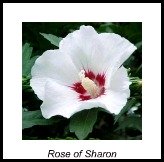The Rose of Sharon
Is the Rose of Sharon a name for Christ Jesus in scripture?
As a boy growing up in the African American Church tradition it was common to hear the preacher and old deacons calling Jesus Christ the; "Rose of Sharon", the "Lilly of the Valley", and the "Bright and Morning Star."
It was not until I was quite grown and developed a love of reading scripture for myself, that I realized that "Rose of Sharon" may only be an in-direct reference to Christ!
The expression appears just once in scripture in the Song of Solomon, as follows: "I am the rose of Sharon, and the lily of the valleys. As the lily among thorns, so is my love among the daughters."
(Song of Songs 2:1-2 KJV)
Technically speaking, Sharon or more correctly; Saron is a place. It's a level plain extending from the Mediterranean to the hill country to the west of Jerusalem, about 30 miles long and from 8 to 15 miles broad. In scripture this place is mentioned for its beauty and fertility in: 1Ch 27:29, Isa 33:9, Isa 35:2, Isa 65:10. It is called Lasharon in Josh 12;18. [1]
While there are varieties of roses that are known to grow on this plain; and some commentators have translated the Hebrew word habatstseleth (found only in these passages), as "rose"; scholars do not agree that the expression refers to any flowers in this plain.
Indeed, many commentators think the "rose of Sharon" is likely a reference to the cistus or rock-rose; several species of which abound in Palestine, and are well known for aroma and pain relieving qualities.
When and how the title Rose of Sharon began to be applied to Christ is not clear. But to call Him thus, is not an injustice. For, Jesus Christ is the epitome of beauty and splendor. His spiritual beauty and majesty as God in the flesh is unsurpassed by any created being in Heaven or on Earth. [2]
"At the name of Jesus every knee shall bow ... and every tongue shall confess that Jesus Christ is Lord, to the glory of God the Father."
(Philippians 2:10-11 KJV)
Scripturally speaking, the text in Song of Solomon chapter 2 verse 1, gives an initial impression that Solomons beloved Shulamite is the speaker referring to herself as the rose of Sharon.
However, in the following verse the speaker's identity is less clear. Listen: "As the lily among thorns, so is my love among the daughters."
(Song of Songs 2:2 KJV)
Is this the voice of the Shulamite woman comparing her unsurpassing love to the other "daughters"? Or is this Solomon commenting on the beauty of his love (that love being the Shulamite woman); which would seem to make Solomon the speaker in both verses?
This being the only reference in the Bible to the "Rose of Sharon" there are not enough contextual clues to be certain. However, there is one other clue, while not conclusive, is still very suggestive and powerful.
Notice, in the first verse the use of the term, "I am". In the Old Testament God told Moses to say to the Jews that His Name is "I AM".
"And God said unto Moses, I AM THAT I AM: and he said, Thus shalt thou say unto the children of Israel, I AM hath sent me unto you."
(Exodus 3:14 KJV)
Admittedly this is speculation. But this speculation goes to the heart of our question. Is the Rose of Sharon a reference to Christ Jesus in scripture?
The Holy Spirit didn't inspire the Bible writers to directly refer to Christ as the Rose of Sharon. But the sweet smell of the flower and its healing qualities never the less speak well of the humility, beauty, and healing power of Christ. This combined with the authority of "I AM" leads me to conclude that the "Rose of Sharon" is indeed an indirect reference to our Lord.
He's altogether lovely.

I think those old deacons got it right! Jesus Christ; He is the "Rose of Sharon", the "Lilly of the Valley", and the "Bright and Morning Star." Amen.
Bibliography:
[1] Matthew George Easton, Rose of Sharon, Saron, in M.G. Easton M.A., D.D., Illustrated Bible Dictionary, http://www.biblestudytools.com/dictionaries/eastons-bible-dictionary/sharon-saron.html.
[2] Kyle Butt, M.A., JesusRose of Sharon, Apologetics Press Articles, March 10, 2011, http://www.apologeticspress.org/article/842.




